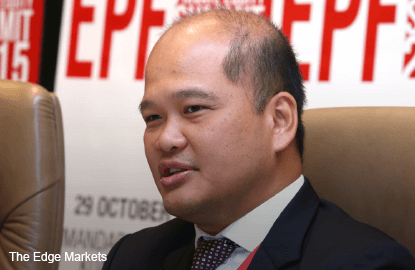
This article first appeared in The Edge Financial Daily, on October 30, 2015.
 KUALA LUMPUR: The Employees Provident Fund (EPF) said it is considering realising its investment in Reading International Business Park in Reading, the United Kingdom, which the fund acquired from the Arlington Business Parks Partnership Fund for £140 million in 2011.
KUALA LUMPUR: The Employees Provident Fund (EPF) said it is considering realising its investment in Reading International Business Park in Reading, the United Kingdom, which the fund acquired from the Arlington Business Parks Partnership Fund for £140 million in 2011.
“Like I said, it is the assets that we look at, whether or not the time has come for us to dispose of them. At this point in time, we have not made any decision whether we should dispose of it (Reading International Business Park),” its chief executive officer Datuk Shahril Ridza Ridzuan told a news conference after the opening of the Global Private Equity Summit 2015 by EPF chairman Tan Sri Samsudin Osman yesterday.
“It really depends on whether we get the right offer and the right price that we think make it worthwhile to dispose of it,” he added.
According to a PropertyWeek.com report dated June 12, the EPF is said to be offering £155 million (RM1.02 billion) for the luxury business park, which currently houses the European headquarters of US telecommunications company Verizon UK Ltd.
Shahril noted that the pension fund has been constantly receiving offers not only for Reading International Business Park, but also its other assets in the UK.
“The issue for us is two things: Is it the right price and the right time to sell, as well as if we do it, whether we can redeploy or reinvest our money for the long term,” he added.
He cited the sale of the One Sheldon Square office building in Paddington, London for £210 million in April, saying that it had yielded significant returns. The EPF bought the nine-storey office block for £156 million back in 2010.
EPF senior general manager of private markets department Mohamad Hafiz Kasim said the fund, which has been focusing on building its property investment portfolio in Europe, particularly the UK, is also keen to invest in the US property market.
“As you know, we are quite big in the UK as well as Europe, and we are slowly getting into the US,” he said.
“Having said that, considering the environment and the property tax relief in the US, we invest in [investment] funds rather than invest directly in properties,” said Mohamad Hafiz.
Aside from the UK, the EPF also owns significant real estate holdings in markets including Germany, France, Australia and Japan.
Meanwhile, Shahril said the EPF is on track to achieve its target of providing at least a return of 2% above inflation.
Shahril said the EPF’s decent performance in the first half of 2015 and manageable inflation will aid the EPF to achieve its target.
“We have always been able to deliver roughly about inflation plus 3% or 3.5%, and our target has been inflation plus 2%.
“Hopefully this year, we should be on track to manage that,” he added.
However, he said it’s still too early to predict if the fund would be able to achieve its target, saying that much will depend on its third- and fourth-quarter performance.
“Given where the [capital] markets have moved since the middle of the year, we are a bit cautious about making predictions,” he said. “It has been a difficult year for the markets.”
In February, the EPF board declared a 6.75% dividend payout for 2014 amounting to RM36.66 billion, equivalent to a rolling three-year return of 4.11% over inflation.
Shahril said currently, the EPF’s investments comprise 50% fixed income, 40% equities, 2% private equities and 8% alternative investments, which include domestic and foreign real estate, as well as infrastructure.
Earlier in his keynote address, Samsudin said the EPF’s asset allocation to private equities had grown by a compound annual growth rate of 24.9% over the last five years.
He said although the EPF began actively trading in the private equity space in 2007, it had only allocated 2% of its asset size to private equities, compared with between 5% and 8% for private equity investors in developed markets.
Despite this, he said the fund added a new asset class in its private market portfolio, which is the natural resource mandate.
“[The] EPF will focus on upstream energy, timberland and agriculture in developed countries, which include Australia and New Zealand,” said Samsudin.
“We believe that this new mandate will provide a better diversification benefit in terms of the risk and return perspective,” he added.